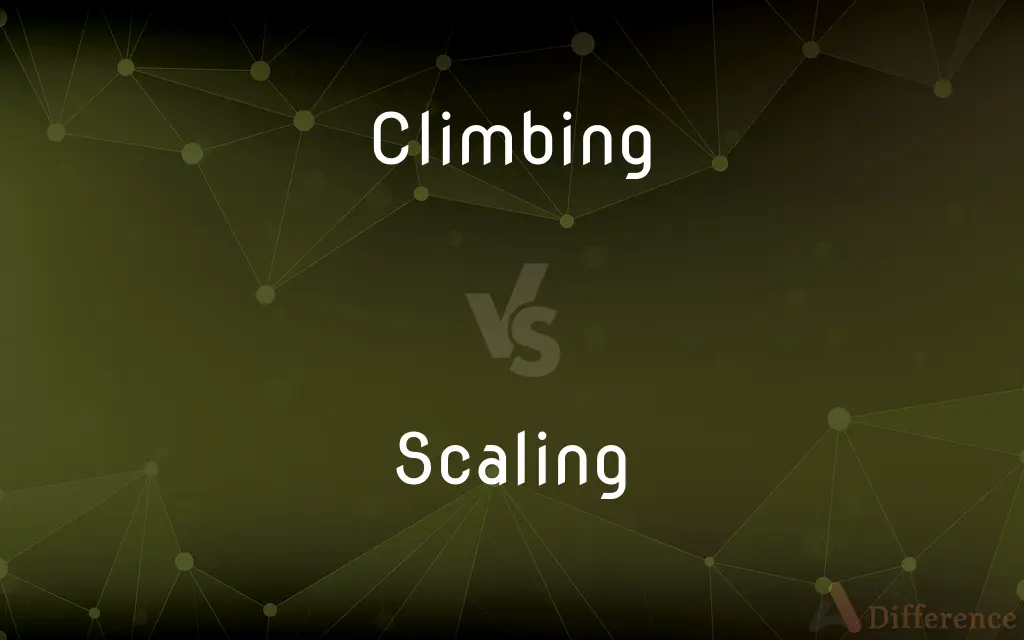Climbing vs. Scaling — What's the Difference?
By Tayyaba Rehman & Urooj Arif — Updated on April 26, 2024
"Climbing" generally refers to ascending vertically using hands and feet or specialized equipment, emphasizing a deliberate and often recreational activity. While "scaling" involves overcoming or climbing up an object or surface, using hands and feet.

Difference Between Climbing and Scaling
Table of Contents
ADVERTISEMENT
Key Differences
"Climbing" is an activity that involves ascending vertically up surfaces such as mountains, rocks, or artificial walls, often for sport or recreation. On the other hand, "scaling" specifically refers to climbing over something quickly and efficiently, usually with the goal of getting past an obstacle.
While climbing can be a leisurely activity focused on technique and endurance, scaling is often seen in more urgent contexts, such as during a rescue operation or in military maneuvers, where the goal is to conquer an obstacle swiftly. Whereas climbing places emphasis on the process and experience of the ascent.
Climbing can be done with various types of equipment like ropes, carabiners, and climbing shoes, which aid in the climber's safety and ability to manage difficult ascents. Conversely, scaling might not necessarily involve specialized equipment and can rely more on natural ability and agility to overcome barriers.
In terms of physical locations, climbing is associated with places specifically meant for this activity, such as climbing gyms, mountains, or dedicated climbing sites. Scaling, however, can occur in a variety of environments where barriers need to be overcome, from urban to natural settings.
Climbing is often a planned activity with a clear path or route, such as following a marked trail up a mountain or a specific route on a climbing wall. Scaling, by comparison, can be more spontaneous, involving quick decision-making and immediate action to navigate over or around obstacles.
ADVERTISEMENT
Comparison Chart
Definition
Ascending vertically for sport or recreation
Climbing over obstacles quickly and efficiently
Context
Recreational, sportive
Utilitarian, dynamic, sometimes urgent
Equipment Used
Ropes, harnesses, climbing shoes
May use minimal or no equipment
Locations
Mountains, climbing gyms
Anywhere with physical barriers
Emphasis
Technique, experience
Efficiency, speed
Compare with Definitions
Climbing
Moving upward, especially by using the hands and feet.
We spent the afternoon climbing in the new gym downtown.
Scaling
Removing scale or buildup from a surface.
Scaling the old paint off the wall proved to be a tedious task.
Climbing
Ascending by means of a ladder or similar device.
He was climbing the ladder to reach the roof.
Scaling
Adjusting the size or level of something to a different standard.
We are scaling up production to meet increased demand.
Climbing
The sport or activity of ascending mountains or artificial rock walls.
She took up climbing to challenge herself physically and mentally.
Scaling
Measuring or marking off at regular intervals.
The architect used a scale ruler for scaling the new building design.
Climbing
Increasing in intensity or amount.
The climbing interest rates concerned the investors.
Scaling
Representing in proportion, especially in a drawing or model.
The engineer scaled the new bridge design to fit the proposed site.
Climbing
Advancing to a higher position or rank.
She has been climbing the corporate ladder at an impressive pace.
Scaling
Climbing up and over an obstacle or barrier.
The soldiers practiced scaling walls during their training exercises.
Climbing
Climbing is the activity of using one's hands, feet, or any other part of the body to ascend a steep topographical object. It is done for locomotion, recreation and competition, and within trades that rely on ascension; such as emergency rescue and military operations.
Scaling
One of the many small hard dermal or epidermal structures that characteristically form the external covering of fishes and reptiles and certain mammals, such as pangolins.
Climbing
To move upward, especially by using the hands and feet
We climbed until we reached the shelter. The truck climbed the mountain highway.
Scaling
A similar part in other animals, such as one of the thin flat overlapping structures that cover the wings of butterflies and moths.
Climbing
To move in a specified direction by using the hands and feet
Climbed down the ladder.
Climbed out the window.
Scaling
A small, thin, often flattened plant structure, such as one of the modified leaves that cover a tree bud or one of the structures that bear the reproductive organs on the cones of a conifer.
Climbing
To engage in the activity or sport of mountain climbing.
Scaling
A dry thin flake of epidermis shed from the skin.
Climbing
To rise slowly or steadily; ascend
The plane climbed into the clouds.
Scaling
A skin lesion or lesions marked by such flakes.
Climbing
To slant or slope upward
The road climbs steeply to the top.
Scaling
A scale insect.
Climbing
To grow in an upward direction, as some plants do, often by means of twining stems or tendrils.
Scaling
A plant disease or infestation caused by scale insects.
Climbing
To move upward on or mount, especially by using the hands and feet or the feet alone; ascend
The hikers climbed the mountain. We climbed the stairs. The tractor climbed the hill.
Scaling
A flaky oxide film formed on a metal, as on iron, that has been heated to high temperatures.
Climbing
To grow in an upward direction on or over
Ivy climbing the walls.
Scaling
A flake of rust.
Climbing
An act of climbing; an ascent
A long, exhausting climb to the top.
Scaling
A hard mineral coating that forms on the inside surface of boilers, kettles, and other containers in which water is repeatedly heated.
Climbing
A place to be climbed
The face of the cliff was a steep climb.
Scaling
A system of ordered marks at fixed intervals used as a reference standard in measurement
A ruler whose scale is in inches.
Climbing
(uncountable) The sport of climbing, ascending a wall or a rock or another object using available holds, generally with the safety of a rope and belayer.
Scaling
An instrument or device bearing such marks.
Climbing
(countable) Climb; ascent.
Scaling
A standard of measurement or judgment; a criterion.
Climbing
Present participle of climb
Scaling
A proportion used in determining the dimensional relationship of a representation to that which it represents
A world map with a scale of 1:4,560,000.
Climbing
That climbs; that grows upwards by gripping onto a surface.
Scaling
A calibrated line, as on a map or an architectural plan, indicating such a proportion.
Climbing
An event that involves rising to a higher point (as in altitude or temperature or intensity etc.)
Scaling
Proper proportion
A house that seemed out of scale with its surroundings.
Scaling
A progressive classification, as of size, amount, importance, or rank
Judging divers' performances on a scale of 1 to 10.
Scaling
A relative level or degree
Entertained on a lavish scale.
Scaling
A minimum wage fixed by contract
Musicians playing a benefit concert for scale.
Scaling
(Mathematics) A system of notation in which the values of numerical expressions are determined by their places relative to the chosen base of the system
The decimal scale.
Scaling
(Music) An ascending or descending collection of pitches proceeding by a specified scheme of intervals.
Scaling
An instrument or machine for weighing.
Scaling
Often scales See balance.
Scaling
Either of the pans, trays, or dishes of a balance.
Scaling
To clear or strip of scale or scales
Scale and clean the fish.
Scaling
To remove in layers or scales
Scaled off the old paint.
Scaling
To cover with scales; encrust.
Scaling
To throw or propel (a thin flat object) through the air or along a surface, such as water or ice.
Scaling
(Dentistry) To remove (tartar) from tooth surfaces with a pointed instrument.
Scaling
To cheat; swindle.
Scaling
To ride on (a tram, for example) without paying the fare.
Scaling
To come off in scales or layers; flake.
Scaling
To become encrusted.
Scaling
To climb up or over; ascend
Scaled the peak.
Scaling
To make in accord with a particular proportion or scale
Scale the model to be one tenth of actual size.
Scaling
To alter according to a standard or by degrees; adjust in calculated amounts
Scaled down their demands.
Scaled back the scheduled pay increase.
Scaling
To estimate or measure the quantity of lumber in (logs or uncut trees).
Scaling
To climb; ascend.
Scaling
To rise in steps or stages.
Scaling
To weigh with a scale.
Scaling
To have a given weight, as determined by a scale
Cargo that scales 11 tons.
Scaling
Present participle of scale
Scaling
The act of one who scales or climbs.
Scaling
The removing of the scales of fish.
Scaling
The formation of a layer of scale on a surface.
Scaling
The removal of a layer of scale from a surface.
Scaling
The measurement of dimensions using a scale.
Scaling
The process of adjusting raw measurement data to fit an expected distribution, such fitting examination results to a normal distribution.
Scaling
The expression of the terms of an equation using powers of nondimensional quantities.
Scaling
Adapted for removing scales, as from a fish; as, a scaling knife; adapted for removing scale, as from the interior of a steam boiler; as, a scaling hammer, bar, etc.
Scaling
Serving as an aid in clambering; as, a scaling ladder, used in assaulting a fortified place.
Scaling
The act of arranging in a graduated series
Scaling
Act of measuring or arranging or adjusting according to a scale
Scaling
Ascent by or as if by a ladder
Common Curiosities
What types of environments are common for scaling?
Scaling can occur in a variety of environments, such as urban buildings during rescue operations, or natural landscapes in outdoor adventure activities.
Is equipment always required for climbing?
While not always necessary, especially in bouldering, equipment is crucial for safety in many types of climbing, particularly in rock climbing and mountaineering.
What skills are important for climbing?
Key climbing skills include strength, flexibility, endurance, and technical knowledge of climbing techniques and safety.
What training is required for effective scaling?
Effective scaling typically requires agility, quick reflexes, and sometimes specific techniques, depending on the environment and context.
How is the term "scaling" used in technology?
In technology, scaling refers to the ability of a system to handle a growing amount of work or its potential to accommodate growth.
Is climbing a competitive sport?
Yes, climbing can be a competitive sport, with events and competitions held worldwide, including inclusion in the Olympics.
Why might someone choose climbing as a hobby?
People often choose climbing as a hobby for physical fitness, mental challenges, and the social aspects of climbing communities.
Can scaling be part of climbing?
Yes, scaling can be considered a component of climbing, especially when climbers need to quickly overcome specific obstacles during their ascent.
How do climbing and scaling differ in their goals?
Climbing often aims at reaching the top of a specific height for recreation or sport, whereas scaling focuses on overcoming barriers efficiently, regardless of the setting.
What does "scaling a business" mean?
In business, scaling means expanding or growing a business efficiently, maintaining or increasing profitability as operations grow.
Share Your Discovery

Previous Comparison
Deepness vs. Depth
Next Comparison
Concierge vs. ReceptionAuthor Spotlight
Written by
Tayyaba RehmanTayyaba Rehman is a distinguished writer, currently serving as a primary contributor to askdifference.com. As a researcher in semantics and etymology, Tayyaba's passion for the complexity of languages and their distinctions has found a perfect home on the platform. Tayyaba delves into the intricacies of language, distinguishing between commonly confused words and phrases, thereby providing clarity for readers worldwide.
Co-written by
Urooj ArifUrooj is a skilled content writer at Ask Difference, known for her exceptional ability to simplify complex topics into engaging and informative content. With a passion for research and a flair for clear, concise writing, she consistently delivers articles that resonate with our diverse audience.
















































